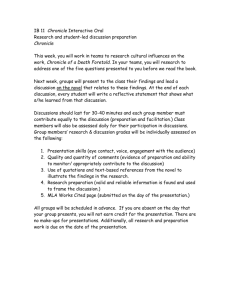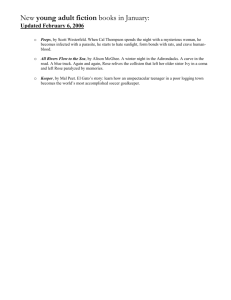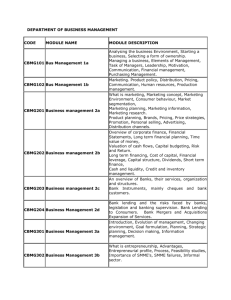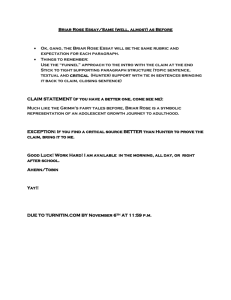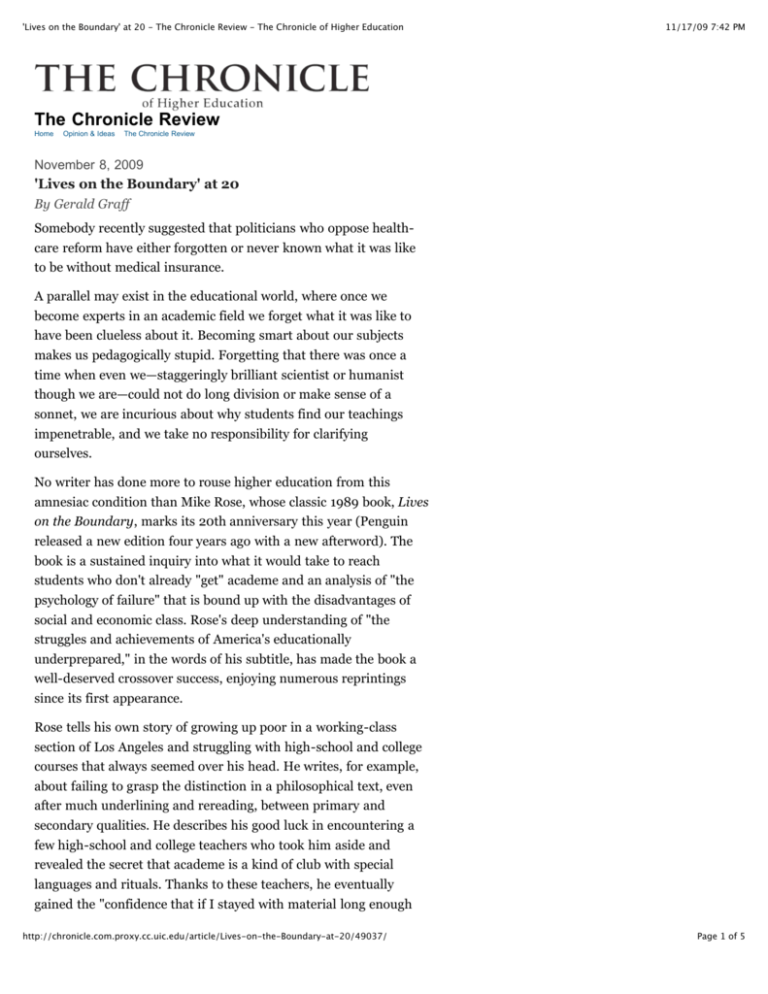
'Lives on the Boundary' at 20 - The Chronicle Review - The Chronicle of Higher Education
11/17/09 7:42 PM
The Chronicle Review
Home
Opinion & Ideas
The Chronicle Review
November 8, 2009
'Lives on the Boundary' at 20
By Gerald Graff
Somebody recently suggested that politicians who oppose healthcare reform have either forgotten or never known what it was like
to be without medical insurance.
A parallel may exist in the educational world, where once we
become experts in an academic field we forget what it was like to
have been clueless about it. Becoming smart about our subjects
makes us pedagogically stupid. Forgetting that there was once a
time when even we—staggeringly brilliant scientist or humanist
though we are—could not do long division or make sense of a
sonnet, we are incurious about why students find our teachings
impenetrable, and we take no responsibility for clarifying
ourselves.
No writer has done more to rouse higher education from this
amnesiac condition than Mike Rose, whose classic 1989 book, Lives
on the Boundary, marks its 20th anniversary this year (Penguin
released a new edition four years ago with a new afterword). The
book is a sustained inquiry into what it would take to reach
students who don't already "get" academe and an analysis of "the
psychology of failure" that is bound up with the disadvantages of
social and economic class. Rose's deep understanding of "the
struggles and achievements of America's educationally
underprepared," in the words of his subtitle, has made the book a
well-deserved crossover success, enjoying numerous reprintings
since its first appearance.
Rose tells his own story of growing up poor in a working-class
section of Los Angeles and struggling with high-school and college
courses that always seemed over his head. He writes, for example,
about failing to grasp the distinction in a philosophical text, even
after much underlining and rereading, between primary and
secondary qualities. He describes his good luck in encountering a
few high-school and college teachers who took him aside and
revealed the secret that academe is a kind of club with special
languages and rituals. Thanks to these teachers, he eventually
gained the "confidence that if I stayed with material long enough
and kept asking questions, I would get it." Most of the book,
http://chronicle.com.proxy.cc.uic.edu/article/Lives-on-the-Boundary-at-20/49037/
Page 1 of 5
'Lives on the Boundary' at 20 - The Chronicle Review - The Chronicle of Higher Education
11/17/09 7:42 PM
and kept asking questions, I would get it." Most of the book,
however, is concerned with students who never reach that point,
never crossing the "boundary" to success in academe and beyond.
Rose writes with a progressive educator's empathy for students
who find the academic world daunting and humiliating. But unlike
some of his fellow progressives, he never romanticizes students or
suggests that we demean them if we believe they need instruction.
And his goal is not to dismantle elite intellectual culture—though
he is sympathetic to teaching alternative texts and ideas—but to
make that culture available to as many as possible. Lastly, in
contrast to current advocates of "teaching for social justice,"
democratic education for Rose isn't a euphemism for converting
students to progressive politics.
In fact, rereading Lives on the Boundary, I was taken by the
convergence of Rose's criticism of the university with that made by
recent education conservatives. Most strikingly, Rose's argument
was echoed by that bête noir of the left, Margaret Spellings, former
secretary of education, who complained in a famous 2006 report
that "most colleges and universities don't accept responsibility for
making sure that those they admit actually succeed." I'll come back
to this point, but I wish that in his afterword Rose had
acknowledged his common ground with conservatives on the need
for standards and accountability.
Rose's common response to cries for education standards is that
such standards are fair only if all students are given the help they
need to meet them, as is far from the case in today's failing schools.
For college instructors, being fair would mean, among other things,
seeing student mistakes as a stage of development rather than a
symptom of cognitive deficiency or hopeless illiteracy. Like Mina
Shaughnessy, whose classic book, Errors and Expectations, he
frequently cites, Rose recognizes that mistakes can be intelligent,
that an error that "crops up because a student is trying new things
is a valuable kind of error, a sign of growth." Colleges, however,
often fail to build on the potential reflected in such errors and
classify struggling students as remedial in ways that deepen their
sense of inferiority. Completing a vicious circle, the popular media
depict student errors as symptoms of cultural collapse, and this
alarmist attitude in turn fuels the current obsession with testing.
One of the strongest aspects of Rose's book for me is his
demonstration that professors fail to identify the misconceptions
about academic work that cause students to fail. Noting that "it is
not unusual for students to come to the university with
http://chronicle.com.proxy.cc.uic.edu/article/Lives-on-the-Boundary-at-20/49037/
Page 2 of 5
'Lives on the Boundary' at 20 - The Chronicle Review - The Chronicle of Higher Education
11/17/09 7:42 PM
not unusual for students to come to the university with
conceptualizations of disciplines that are out of sync with academic
reality," he argues that the college curriculum is often "a litany of
misdirection" that increases the "dissonance between the academy's
and the students' definition of disciplines." This dissonance makes
it "hard for students to get their bearings with material: to know
what's important, to see how the pieces fit together, to follow an
argument, to have a sense of what can be passed over lightly." He
writes of students who desperately try to copy down everything a
lecturer says—as he once did—since they have no way of
distinguishing the crucial from the incidental. "The special nature"
of academic demands, Rose writes, "is not made the focus of
attention that it should be," and courses "are not taught explicitly
and self-consciously as courses on how to think as a chemist or
psychologist or a literary critic."
All too true, I think. Indeed, undergraduate liberal education itself
has often operated on the self-fulfilling premise that thinking "as a
chemist or psychologist or a literary critic"—joining the academic
club—is something that only careerist graduate students would
have any reason to do. And the longer we work in a system in
which most undergraduates don't join the academic club, the easier
it becomes to justify teaching mainly to the top 10 percent and
letting the rest fend for themselves. Instead of discussing what it
would take to let all students in on what Rose calls "the secret talk
… the shared concepts and catchphrases of Western liberal
learning," we rationalize that if students remain outsiders to the
club, it is their problem, not ours.
Rose argues that to change course "we need an orientation … that
provides guidance on how to determine and honor the beliefs and
stories, enthusiasms, and apprehensions that students reveal." This
Deweyan advice to start where the students already are may sound
like a plea to dumb down the curriculum, but for Rose it simply
recognizes that to teach anything successfully, we have to build on
what the learner already knows and thinks. Some of the book's best
vignettes describe students who find many of the assumptions of
academe profoundly counterintuitive but get little help in grasping
them.
Take Lucia, for example, a single working mother who is unfairly
written off as a "poor reader" because her working-class Roman
Catholicism prevents her from understanding an assigned essay
that debunks Freudianism by calling it a religion. Then there is
Scott, who refuses to enter a debate in a science class over "a finite
versus an infinite universe" because, as he sees it, "This is the kind
of question … that you'll argue and argue about. It's stupid. No one
http://chronicle.com.proxy.cc.uic.edu/article/Lives-on-the-Boundary-at-20/49037/
Page 3 of 5
'Lives on the Boundary' at 20 - The Chronicle Review - The Chronicle of Higher Education
11/17/09 7:42 PM
of question … that you'll argue and argue about. It's stupid. No one
wins. So why do it?" As Rose observes, "university professors have
for so long been socialized into the critical stance required to join
such discussions "that they don't realize how unsettling it can be to
students who don't share their unusual background." As brilliant as
those professors are in dissecting all things, they often show little
understanding of "what it means to be underprepared" in their own
world.
But this brings me back to my wish that Rose had noted the
convergence between his critique of higher education and that of
conservatives who call for well-defined educational standards and
accountability. In his afterword, Rose considers such demands and
their problematic impact on schools since his book's original
publication, but he responds to them only by rehearsing familiar
complaints about testing. He thus misses an opportunity to make
the case implied by his own critique of education for a more
intelligent view of standards and accountability.
Rose complains that real education gets left out when reforms are
driven solely by "concern about economic readiness" and workforce competitiveness, that "reforms that have high-stakes tests as
their centerpiece can lead to the narrowing of curriculum to fit the
tests." It's true that the tests mandated by the No Child Left Behind
Act have often resulted in classrooms that are mind-numbingly
boring and irrelevant to students. But if Rose is right that colleges
hide the secrets of academic success from many students, and if
this obfuscation trickles down to the schools, then calls for greater
accountability are not only justified but badly overdue.
Rose does concede that "it is crucial to have some means of quality
control," but he says nothing about how educational quality control
might be carried out and comes across generally as defensive about
it. Rose also fails to mention that it is conservatives who take
quality control most seriously while many of his allies on the
educational left either see no need for it or debunk the very idea as
ideologically suspect.
To find Rose defending standards against attacks on them from the
educational left, one has to go to other writings he has published
since the first appearance of Lives on the Boundary. In one essay,
for example, in the 2006 collection An Open Language (St.
Martin's Press), Rose clearly has the educational left in mind when
he says that "people leery about calls for standards need to
remember their benefits and reclaim them for democratic ends,
despite the fact that standards and assessments in the past too
often have been used to stratify students into educational tracks
http://chronicle.com.proxy.cc.uic.edu/article/Lives-on-the-Boundary-at-20/49037/
Page 4 of 5
'Lives on the Boundary' at 20 - The Chronicle Review - The Chronicle of Higher Education
11/17/09 7:42 PM
often have been used to stratify students into educational tracks
based more on economic and racial background than on academic
ability." Yes—reclaim standards "for democratic ends" instead of
dismissing them as repressive! In his afterword, however, we hear
only about how standards and assessments are "used to stratify
students" by social class, and nothing about the need to reclaim
those things for democratic ends.
As great a book as Lives on the Boundary is, I think Rose's work
would speak even more usefully to our present situation if he came
out more aggressively and publicly for the democratic reclamation
of educational standards and accountability that follows from his
analysis, even if doing that would mean saying things that some of
his political allies won't want to hear. With his rare grasp of the
academic world and why many students fail in it, Rose would be in
a position to show current policy makers how to get standards and
assessment right. But those policy makers aren't likely to listen to
any of us in higher education as long as our response to standards
is more defensive than opportunistic.
Gerald Graff, a past president of the Modern Language
Association, is a professor of English and education at the
University of Illinois at Chicago.
Copyright 2009. All Rights reserved
The Chronicle of Higher Education 1255 Twenty-Third St, N.W. Washington, D.C. 20037
http://chronicle.com.proxy.cc.uic.edu/article/Lives-on-the-Boundary-at-20/49037/
Page 5 of 5

